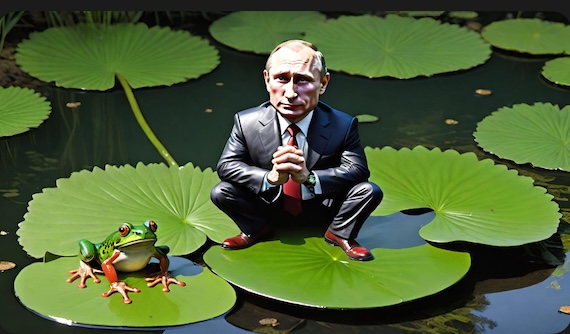Trabzon, Turkey (Special to Informed Comment; Feature) – When former U.S. President Barack Obama referred to Russia as a “regional power” at the 2014 Nuclear Security Summit in The Hague, he minimized Moscow’s global influence while recognizing its ability to a have an impact on events within its immediate vicinity. Obama further downplayed the notion of Russia as a primary geopolitical threat, stating, “With respect to Mr. Romney’s assertion that Russia is our number-one geopolitical foe, the truth of the matter is that America has got a whole lot of challenges. … The fact that Russia felt compelled to go in militarily and lay bare these violations of international law indicates less influence, not more.” Many interpreted these remarks as a rhetorical slight, considering Russia’s significant role in shaping post-Soviet geopolitics.
Over the following decade, Russia’s military intervention in Syria appeared to contradict Obama’s assessment. Russia’s involvement in Syria during this period was often cited as evidence of its great power status. Nevertheless, the collapse of Bashar al-Assad’s regime on December 7, 2024, highlights the limits of Russian power and its declining ability to exert influence on a global scale.
While Russia’s relations with its neighbors have frequently been strained owing to competition for influence and unresolved issues from the Soviet era, its involvement in Syria—a country neither adjacent to Russia nor part of the post-Soviet sphere—was significant. Russia’s direct engagement in the Syrian conflict marked a major shift in its Middle Eastern policy and was perceived as a challenge to the U.S. presence in the region. As Fadi Elhusseini noted, “Even at the peak of the Cold War, Russia’s (either the Soviet Union’s or the Russian Federation’s) role was limited to sending arms, military advisors, and logistical support to its Arab allies. This intervention represented a dramatic escalation in Russia’s involvement and signaled an extraordinary military engagement.”
The establishment of a military base in Latakia in 2015 represented Russia’s first substantial intervention outside its post-Soviet sphere of influence. This action not only sustained Assad’s regime for nearly a decade but also positioned Moscow as a key actor in the Middle East. Russia’s airstrikes and military presence forced Western powers, including NATO, to navigate the Syrian conflict cautiously. At the time, this was celebrated as a reassertion of Russia’s standing as a global power.

“Small Frog in Large Pond,” Digital, Dream / Dreamland v3, 2024
The events of early December 2024, however, have undermined this perception. A series of swift offensives by opposition forces reclaimed key cities, including Aleppo, Homs, and Hama, culminating in the fall of Damascus. Despite the continued presence of Russia’s military base, its inability—or reluctance—to prevent Assad’s downfall raises significant questions about the efficacy of its deterrence strategy. The Syrian opposition, while avoiding direct confrontation with Russian forces, demonstrated that Moscow’s influence in the region is far from absolute.
The implications of these developments are profound. For years, Russian military bases, like those of the United States, were regarded as a guarantee of security for allied regimes. However, the fall of Assad challenges the perception of Russian deterrence. Unlike the United States, which operates over 800 military bases worldwide and has a longstanding history of protecting client states, Russia’s military footprint is far more limited in scope and effectiveness. During the Cold War, U.S. bases served as a counterbalance to Soviet expansion, and they remain a cornerstone in countering both Russian and Chinese influence today. Russia’s failure in Syria suggests that its bases no longer function as a comparable strategic asset.
Russia may attempt to salvage its position through diplomacy or by leveraging its remaining influence in Syria. It could even claim to have facilitated the transition to protect its own interests. Yet, such efforts are unlikely to conceal the reality that Moscow failed to sustain Assad’s rule despite years of military and political investment. This failure will undoubtedly prompt potential allies to reconsider seeking security assurances from Russia, further diminishing its credibility as a global power.
A hallmark of great power status is the ability to operate effectively on multiple fronts. While Russia remains heavily engaged in the war in Ukraine, a true global power would possess the capability to uphold commitments in other regions simultaneously. Moscow’s inability to do so in Syria reinforces Obama’s 2014 characterization: Russia is not a global power but rather a regional one, capable of exerting influence in its immediate vicinity but falling short of broader global ambitions.
The fall of Assad serves as a stark reminder of the limitations of Russian power. It challenges the assumption that military bases alone can ensure sustained influence and raises doubts about Moscow’s ability to act as a reliable guarantor of stability. As the situation in Damascus stabilizes, the world is left to reassess the extent of Russia’s role in shaping global affairs. Indeed, this development may serve as a cautionary message for nations whose security heavily depends on the military bases of foreign patrons -— including those allied with the United States.


 © 2026 All Rights Reserved
© 2026 All Rights Reserved